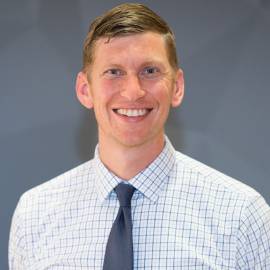
Drew Gossen, PhD.
Biography
Originally from northwest Oklahoma, Dr. Gossen joined the faculty at the University of South Alabama in 2021. Bringing over a decade of classroom experience and a robust research background, they currently serve the university community from their home on the Eastern Shore of Mobile Bay.
Dr. Gossen’s academic career is rooted in a deep commitment to educational leadership and specialized pedagogy, attending both Oklahoma State University and Southwestern Oklahoma State University.
Prior to their transition to higher education, Dr. Gossen dedicated eleven years to Oklahoma’s K-12 system. During this tenure, they taught a diverse range of grade levels and curricula within the STEM fields (Science and Mathematics) and served the student body as a multi-sport coach.
While pursuing their doctorate at Oklahoma State University, Dr. Gossen spent four years as a Graduate Teaching and Research Assistant, contributing to the field through both instructional excellence and academic inquiry.
Now a resident of Daphne, Alabama, Dr. Gossen enjoys the unique landscape of the Gulf Coast alongside his wife and children. He is an avid outdoor enthusiast, spending their time hiking, visiting local beaches, and exploring the coastal region.
Teaching Philosophy
"I believe teaching is the greatest vocation on Earth. Teachers help shape the world through their influence on students of all ages, and have the opportunity to help students become lifelong learners. My role as a teacher of future teachers is to help them develop the skills necessary to be effective in their own classrooms while recognizing the significance of their contributions to their own students’ education.
When these preservice teachers come into my classroom, I want them to be a part of a culture of inquiry—where questions, failures, and ‘aha’ moments are a normal part of the learning process. I strive to model effective teaching strategies while the students learn scientific knowledge and skills alongside teaching methods. Students will consider the principles of how students learn and develop curriculum and teaching approaches that fit these principles. Most of all, I want teachers to leave my classroom excited to teach science!"
Research
Dr. Gossen's research comprises two main areas: (1) student learning experiences and STEM beliefs, and (2) STEM teacher preparation.
His research with K-12 students examines the types of learning experiences these students have and how those experiences influence their STEM beliefs and goals. Learning experiences happen in a variety of learning environments, and while this starts with the things that happen in the classroom, there are many opportunities for students to learn outside the classroom as well. Informal learning environments such as STEM camps, science centers, museums, and even family activities have an impact on students’ beliefs about their own STEM abilities and eventually their desire to pursue a STEM career.
Dr. Gossen's research with teachers involves the development of science content knowledge and pedagogical skills as a preservice teacher and ongoing classroom support for inservice teachers. As preservice teachers make the transition from college student to classroom teacher, they need to understand scientific content, skills, and pedagogy. This is a significant challenge, and we are looking for ways to improve this process for all students. As teachers navigate STEM teaching in the classroom, they are sometimes left with poor guidance or support to develop effective curriculum. Dr. Gossen is exploring these issues with the goal of improving teacher performance to enhance student learning in the classroom.
Outreach
Dr. Gossen's research and teaching goals are centered on reaching teachers and students in the community. He is working to develop tools and professional development that meet the needs of teachers in our local schools, while supporting the great work our local partners are already doing. Dr. Gossen's research focuses on how to help capable students pursue and persist in STEM careers. Through funded projects and individual research, he is striving to connect students, teachers, academics, and local industry to provide opportunities for the next generation of the STEM workforce.
